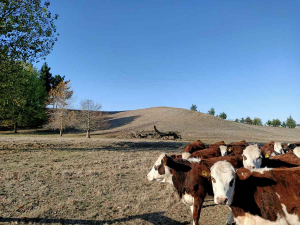Early drought fears ease in Hawke’s Bay, but caution remains
Fears of a serious early drought in Hawke’s Bay have been allayed – for the moment at least.
 Recent rain goes nowhere near to breaking the drought, according to Matt Ward, Beef+Lamb NZ’s North Island manager.
Recent rain goes nowhere near to breaking the drought, according to Matt Ward, Beef+Lamb NZ’s North Island manager.
In the past few weeks, rain has fallen in many parts of the country with grass starting to grow again.
However, while this is helpful and looks good, it goes nowhere near to breaking the drought, according to Matt Ward, Beef+Lamb NZ’s North Island manager.
“Some parts of the Waikato are pretty good and some parts of the East Coast are looking okay,” he told Rural News. “But other areas are still very far behind because of frosts and lower temperatures – especially for those farms up under the ranges.”
Ward says the Wairarapa, which was looking pretty bad, is now in a better position than most. However, the King Country and around Taumaranui are very short of feed.
“Taranaki, Manawatu and Horowhenua are looking okay, but they are long way from where they normally are at this time of the year.”
In the South Island, Ward says Marlborough and North Canterbury are still a long way behind and notes that the B+LNZ Future Farm in North Canterbury is a long way behind where it normally is at this time of the year.
“Overall, the ME is not great in many of the pastures. The green tinge is there but there is not a huge amount of substances in the grass.”
Ward says one farmer in Otago reported that he was halfway through his winter feed because he is having to keep stock on for longer due to high processing demand and Covid-related capacity restrictions at the works.
He says the meat processing companies have done a tremendous job, given the difficult circumstances, and have worked extra shifts to process stock.
But the fact remains there is a still a feed shortage around the country with baleage hard to procure.
“Down south there are feed shortages because of the rain and some of the fodder crops put in to feed stock during winter have not grown well and yields are down.”
Ward says with the stocks of baleage around the country very low, farmers have to look for alternatives such as palm kernel and even rice and wheat bran from Australia. The East Coast is suffering a severe feed shortage with one farm consultant suggesting that the region needs in the order of 770,000 bales of baleage to meet feed demand.
“Many farmers are applying nitrogen fertiliser and in places such as the Waikato and Northland, where soil temperatures are still warm, this will have benefits. But where farms are in colder areas applying nitrogen may be of little benefit,” Ward says.
How great is the green?
It could take three or more years for some farmers to fully recover from the drought and lack of feed for stock that has hit most parts of the country, according to Matt Ward.
He says this is based on the fact that it took a similar time for some farmers around Taihape in the Central North Island to recover from a severe drought a few years ago. He says the current drought means it will take farmers several years to build up capital stock again, which they have had to sell in the past few months because there was no feed for them.
“In good times farmers would usually look to mate their hoggets, but many have decided not to do this because these animals were not in the condition to do so,” Ward told Rural News.
“They also delayed putting the ram out so their ewes would be in better condition. Early reports on scanning rates suggest that in some parts of the country these are down by 30% - therefore there will be less lambs hitting the ground in spring.”
Ward believes MPI has done a good job by appointing feed coordinators in both the North and South Islands. He says these people will continue their work during the winter months and into early spring.
“A big concern would be if the winter rains do not come, because not only would that affect pasture growth, water storage would be down and this could affect the dairy industry in particular.”
Farmer confidence has taken a slight dip according to the final Rabobank rural confidence survey for the year.
Former Agriculture Minister and Otaki farmer Nathan Guy has been appointed New Zealand’s Special Agricultural Trade Envoy (SATE).
Alliance Group has commissioned a new heat pump system at its Mataura processing plant in Southland.
Fonterra has slashed another 50c off its milk price forecast as global milk flows shows no sign of easing.
Meat processors are hopeful that the additional 15% tariff on lamb exports to the US will also come off.
Fears of a serious early drought in Hawke’s Bay have been allayed – for the moment at least.